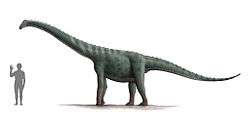Rinconsaurus
| Rinconsaurus Temporal range: Late Cretaceous | |
|---|---|
 | |
| Rinconsaurus | |
| Scientific classification | |
| Kingdom: | Animalia |
| Phylum: | Chordata |
| Class: | Sauropsida |
| Superorder: | Dinosauria |
| Order: | Saurischia |
| Suborder: | Sauropodomorpha |
| Infraorder: | Sauropoda |
| (unranked): | Titanosauria |
| Family: | unknown |
| Genus: | Rinconsaurus Calvo & Riga, 2003 |
| Species | |
| |
Rinconsaurus is a genus of dinosaur from the Late Cretaceous. It was a titanosaurid sauropod which lived in what is now Argentina. The type species, Rinconsaurus caudamirus, was described by Calvo and Riga in 2003, and is based on three partial skeletons.
Description
Like all sauropods, Rinconsaurus was a large long-necked quadrupedal animal, with a long, whip-like tail and four pillar-like legs. Rinconsaurus was an unusually slender sauropod. Although fossil discoveries are incomplete, and no complete necks or heads have been found, fully grown Rinconsaurus are estimated to have been 11 meters (36 ft) long and approximately 2.5 meters (8 ft) high at the shoulder.[1] Though only a portion of one skull has been recovered, Rinconsaurus may have had a long, narrow skull, based on fossil evidence of the skulls of related titanosaurs.
Discovery and species
Fossils of Rinconsaurus were discovered in 1997 by Gabriel Benítez near Rincón de los Sauces, in the Neuquen province of Argentina. The fossils, which consisted of three individuals (two adults and one juvenile), were excavated by Jorge Calvo of the Paleontology Museum of the National University of Comahue.[1]
The type, and only known species, Rinconsaurus caudamirus, was described by Calvo and Bernardo J. González Riga of the Paleovertebrate Laboratory in Mendoza, Argentina, in 2003. The authors noted derived traits unique to the genus, including distinctive tail vertebrae with bony processes. The fossil remains included vertebrae, limb bones, scapula, hip bones (pubis, ilium, and ischium) and several ribs. Cranial fragments, a mandible, and two teeth have also been discovered. These teeth resemble those of another titanosaurid, Malawisaurus dixeyi.[1]
The generic name refers to Rincón de los Sauces, where the fossils were discovered, while the specific name, caudamirus, means "amazing tail", in reference to the unusual shape of the tail vertebrae.[1]
Classification
Rinconsaurus is a titanosaurid sauropod. Within the titanosaurs, Coria and Riga regard this dinosaur as closely related to Aeolosaurus based on several derived traits.[1] In 2007, Casal et al. assigned Rinconsaurus, Gondwanatitan, and Aeolosaurus to Aeolosaurini, a proposed stem-based clade of titanosaurs.[2] It remains to be seen, however, if this classification will receive widespread acceptance.
Paleobiology
Diet
Rinconsaurus, like all sauropods, was an herbivore. Fossilized dung associated with late Cretaceous titanosaurids has revealed phytoliths, silicified plant fragments, that offer clues to a broad, unselective plant diet. Besides the plant remains that might have been expected, such as cycads and conifers, discoveries published in 2005 revealed an unexpectedly wide range of monocotyledons, including palms and grasses (Poaceae), including ancestors of rice and bamboo, which has given rise to speculation that herbivorous dinosaurs and grasses co-evolved.[3]
Titanosaurid teeth are usually spatulate (spoon-shaped) or shaped like pegs. Teeth found in association with Rinconsaurus have been described as "pencil-chisel-like teeth" and had sharply inclined wear facets.[1] Without the ability to grind food, Rinconsaurus, like other sauropods, would have stripped foliage.
References
- 1 2 3 4 5 6 Coria, Jorge; B.J.G. Riga (2003). "Rinconsaurus caudamirus gen. et sp nov., a new titanosaurid (Dinosauria, Sauropoda) from the Late Cretaceous of Patagonia, Argentina". Revista Geologica de Chile 30 (2): 333–353. doi:10.4067/s0716-02082003000200011. ISSN 0716-0208. Retrieved 2007-05-21.
- ↑ Casal, G.; Martínez, R.D.; Luna, M.; Sciutto, J.C; and Lamanna, M.C. (2007). "Aeolosaurus colhuehuapensis sp. nov. (Sauropoda, Titanosauria) de la Formación Bajo Barreal, Cretácico Superior de Argentina [Aeolosaurus colhuehuapensis sp. nov. (Sauropoda, Titanosauria) from the Bajo Barreal Formation, Upper Cretaceous of Argentina]". Revista Brasileira de Paleontologia 10(1):53-62
- ↑ Prasad, V.; Caroline A. E. Strömberg, Habib Alimohammadian, and Ashok Sahni, CA; Alimohammadian, H; Sahni, A (2005). "Dinosaur Coprolites and the Early Evolution of Grasses and Grazers". Science 310 (5751): 1177–1180. doi:10.1126/science.1118806. PMID 16293759.
External links
- Rinconsaurus caudamirus gen. et sp. nov., a new titanosaurid (Dinosauria, Sauropoda) from the Late Cretaceous of Patagonia, Argentina Original paper describing Rinconsaurus (technical)
- Saltasauridae from Thescelosaurus!
- Rinconsaurus DinoData.org